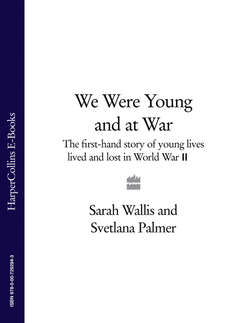Читать книгу We Were Young and at War: The first-hand story of young lives lived and lost in World War Two - Sarah Wallis - Страница 11
3 September 1939
ОглавлениеHalf past midnight, an air-raid siren. I curse like a trooper. It’s cold, dark and horrible outside. In the shelter we mess around a bit, but as usual the women shriek at us, ‘This is war, you know—it’s not a party!’ We go out onto the street. We’d rather face the cold and the bombs than be with those old hags! Long live humour, down with hysteria!
The siren stops, we go to bed, but at five in the morning another one goes off. I grope for some clothes (it’s cold, I’m half asleep) and bolt for the fire point. All quiet until nine, the siren has stopped. After that I’m on duty. It warms up. People everywhere are making piles of earth around their cellars. They’re trampling all over the grass, digging it up with spades. The liaisons from our building get together, we chat, tell stupid jokes, then we all chip in. Three of us go out searching and come back with 300 grams of seeds. We share them out equally, offering some to the girls and any small children who are around. Suddenly, a siren sounds. We go downstairs for cover, I read out my comedy sketches. It gets stuffy so we go up to the third floor. Suddenly there’s good news. It’s reported on the radio that England has declared war on Germany. We shout for joy and run out to share the good news, in spite of the siren. The radio broadcasts ‘God save the King’, ‘The Marseillaise’ and ‘Poland is not yet lost’ [Polish National Anthem]. It feels good.
After dinner—another siren. The first big air raid on Łódź. Twelve planes in triangles of three have broken through the defence lines and are bombing the city. We stand in front of the entrance to our block of
Page from Dawid’s diary, September 1939.
flats and watch the battle. Little clouds of smoke appear around the planes from the shots fired by our anti-aircraft artillery. The squadron manages to evade them, then we see clouds of smoke coming from somewhere in the town centre. Incendiary bombs! Soon we can see smoke in other parts too. All of a sudden we see the planes coming towards us. Terrified, fighting the urge to watch, we take cover on the staircase, then come out again, repeating this about twenty times in five minutes. Three planes fly overhead, it looks like we’re about to be bombed, but no. We breathe a sigh of relief. The next three pass over and leave us in peace too. The rest of the planes disappear. The danger is over, for now at least. We tell the terrified, distressed women in the shelter what has happened. Some of them are holding small children in their arms. It’s a truly moving scene. Suddenly, a neighbourhood liaison in a gas mask runs in and reports that gas has been thrown in several places in the city. Panic sets in. The lucky owners of gas masks put them on, others take out their gauze pads. Outside it gets cold and windy. We beat the gong as an alarm. Tumult, fear, commotion. At last everything calms down. The gas warning turns out to be a false alarm.
This evening’s news is as welcome as this morning’s—France and Australia have joined the war! And the Polish soldiers on Westerplatte are still holding on, not letting the Krauts advance a step further, even though there are many more of them. And the station in Zbszyń has been taken back from the Germans! We say goodnight and go to bed full of joy.
